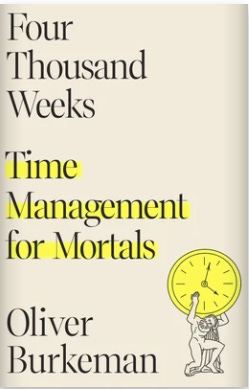Welcome! You’ve reached Spark. Learn more here or just read on. If you received this from a friend, please join us by subscribing. It’s free! All you have to do is press the button below:
In This Issue:
How much time do we have? All the time there is
Short reads from Emma Thompson and Walt Whitman
New resources for readers and writers
Time Management for Mortals
“The problem with attempting to master your time, it turns out, is that time ends up mastering you.” - Oliver Burkeman, Four Thousand Weeks: Time Management for Mortals
This morning, around 7:00 Eastern time, I turned 3,386 weeks old. If I live to be 80, I have another 774 weeks to get this life of mine right. I’m not guaranteed any of those weeks, of course. I am not even guaranteed the next five minutes. Which means I will leave this life with a lot of tasks unfinished, dreams unrealized, and relationships that could have used more tending. I will have only a faint glimmer of understanding about the question that I’ve been either tackling or dodging most of my weeks on this earth: how to live.
I have just finished Oliver Burkeman’s latest book, Four Thousand Weeks: Time Management for Mortals. The book was one of those that popped into my life at a good time. I have been struggling with my choices lately. I’ve been bumping up against limits of time, energy, and the desire to be and do more than it is possible to be or do. I’ve caught myself viewing the prospect of my mortality with resentment as if it were some kind of insult the universe has thrown at me.
As Burkeman reminds us, however, the universe could care less. We are going to live and then we are going to die and most of us are not going to leave much of a dent. The good news is that there is freedom in that.
Burkeman is a self-described “productivity nerd” who bumped up against some limits of his own when he realized that no matter how many tools he employed, or how many theories he applied, he’d never do all he expected of himself or felt was expected of him. Also: he became a father to a small child who has, apparently, taught him much about living in real time. Early on in the book he writes,
“My productivity obsession has been serving a hidden emotional agenda…As long as I was always just on the cusp of mastering my time, I could avoid the thought that what life was really demanding from me might involve surrendering the craving for mastery and diving into the unknown instead.”
“...most of us invest a lot of energy, one way or another, in trying to avoid fully experiencing the reality in which we find ourselves.” - Oliver Burkeman, Four Thousand Weeks: Time Management for Mortals
I felt a shock of recognition when I read those words.
This was not going to be the average “how to” book involving time management, productivity, or how to be happier and more content with the life I have. I resist those; they trigger performance anxiety and, ultimately, compound a sense of failure that lurks inside me.
Back in the late 80s, early 90s when my employer introduced me to The Franklin Planner and Stephen Covey’s “Seven Habits of Highly Successful People.” I was only a few years out from my M.B.A, a degree that I’d pursued because it would shape up my liberal-arts-English-major self and give me a shot at the kinds of jobs that would actually sustain my son and me. I was easily overwhelmed by the sheer number of tasks that came with my responsibilities at home and work and, at the same time, was surrounded by business folk who liked to talk a lot about goals and strategies for reaching them. Covey offered seven basic recommendations and a whole line of calendars, day timers, and other tools to help put those recommendations into action.
I went big: I bought the “Monarch” planner, a zipped brown leather satchel with handles large enough to contain hundreds of 8X11 pages formatted for every conceivable purpose and priority. I had tabs for work, for home, for my thoughts and dreams. I had all kinds of lists coded by project and importance. There was an entire “reference” section where, in addition to key contacts, I kept frequent flier numbers, clippings from various articles, notes on how to be more productive. The planner required regular maintenance, updates, and re-visiting. It required time and consumed precious minutes, sometimes hours while I focused on organizing my days instead of experiencing them as fully as I might have done.
I eventually gave up my planner but – even in the face of life lesson after life lesson – the idea of a perfectly-lived life exists in me. This idea no longer rests solely on the ability to manage my time, have goals, be a good person, be successful but on finding wisdom, grace, and acceptance. Inherent in this idea is the idea of destination, arrival. I would achieve a state when living was easier, and my life would add up to something meaningful.
When I look back on the 3,386 weeks I’ve already spent on this earth, a huge number of them have been spent resisting the obvious: there is no “arrival,” there is only the path in front of me right now. Burkeman does us all a favor by reminding us of this, and he does it, not with cautionary tales or lists or strategies but by consulting current-day thinkers and those from ages past who fall well outside the realm of “productivity.” In the pages of his book, I came face-to-face with a few bracing truths:
Being alive at all is “happenstance” and it comes with no guarantees
My life is finite and short relative to the universe - and there is nothing I can do about it
Time does not live apart from me – I can’t spend it, waste i I can only live it
The universe is indifferent to how we live our lives - no one is going to tell me if I got it right or now
The day I finally know what I am doing is never going to arrive
The state of having no problems is never going to arrive
Every time I make one choice, it removes others from my menu of options. This makes what I choose more, not less, meaningful because that menu includes other things that deeply matter to me
One I make a choice, just do the work for its own sake. We lose if we treat everything we’re doing as valuable only if it helps to lay the groundwork for something else.
No matter how hard I might try or worry, I can do little to direct the future or control how my life unfolds but this too, offers a slant of light: “...the paradoxical reward for accepting reality’s constraints is that they no longer feel so constraining.”
Burkeman steps away from the usual format of self-help books and guides to productivity. There are no answers in this book. He makes no recommendations, no handy lists of seven things to do. Instead, he debunks the concepts that suggest time can be managed at all and weaves in thinking from philosophers, teachers, scientists, writers and occasional research. Much of what he offers here will resonate with people who are emerging from these past two years of the “Pandemic Pause” newly aware of the fleeting nature of life and the value of being forced to be still with whatever is unfolding. Others who have read their Richard Rohr or have long experience with Twelve Step programs will be at home with the focus on what we can control and what we can’t. He addresses the tension between having hope and desire to see the fruits of our labors and working towards goals that will require effort way past our lifetimes. In the end, he offers a set of questions aimed at helping the reader to think about what they are able and want to do with the time they have. The answers are up to us.
What books have helped you most with the question of how to live more fully?
If you would like to listen before you read, here are two online talks by Oliver Burkeman about his new book.
Here is a talk Burkeman gave about his book:
Talk at Google (55 mins)
Brief Talk on YouTube (12 mins)
A Franklin Planner Memory
My sister recently reminded me of the time my Franklin Planner and I flew from Newark to Steamboat Springs where she worked a range of different jobs, skied a lot, and made a lot of really wonderful friends who came and went from her little rented house whenever the urge struck. Somewhere along the line, I left the thing on her kitchen table where it took up an obnoxious amount of space. One of her friends walked in “just to see what was going on.” His eyes popped wide at the sight of the planner spread open, columns of lists and tabs for my calendar, my priorities, my address book exposed.
“Now there,” he said to my sister after I left the room to get something, “Is a person with a LIFE.”
I heard my sister murmur in assent and then say, “I’m afraid to touch it.”
Short, Beautiful Reads
This short read was sent my way by Spark community member Mary K. in Florida. It’s a brief, beautiful read that captures three woman connected by blood but also by time.
Emma Thompson: The Woman Who Stands Between
“Whatever made us think we could live without this? We were stuck on our goals and our aspirations and – God forbid – our dreams. We were too busy to notice how the bodies silently speak to one another, how we breathe each other in, recalibrate and breathe out.” - Emma Thompson, from The Guardian “...my daughter thrums with life, my mother is frail – and I’m balanced between
Walt Whitman’s To Think of Time
“To think of time—of all that retrospection!
To think of to-day, and the ages continued henceforward!
Have you guess'd you yourself would not continue?
Have you dreaded these earth-beetles?
Have you fear'd the future would be nothing to you?
Is to-day nothing? Is the beginningless past nothing?
If the future is nothing, they are just as surely nothing.
To think that the sun rose in the east! that men and women
were flexible, real, alive! that everything was alive!
To think that you and I did not see, feel, think, nor bear our
Part!
To think that we are now here, and bear our part!”
Read the rest HERE
Resources for Readers and Book Clubs
If you liked our conversation last week about books that lead us home (and away), check out “Strong Sense of Place” , a podcast and website dedicated to travel and books inspired by place. You’ll find a recent contribution there from Elizabeth Held, Spark community member and publisher of What to Read If…, another fantastic resource for readers and book clubs. Here she recommends 6 books that will help readers remain cozy in the cold and snow.
LA Times Book Club - here is Jane Goodall If you are a Jane Goodall fan, sign up HERE for her talk with the LA Times Book Club on February 28. If you’d like to browse the many other interviews conducted by the Book Club over the past year, you’ll find them here: Los Angeles Times Book Club.
Resources for Writers and Writing Groups
Elizabeth McCracken (Bowlaway, The Souvenir Museum) will be on the faculty for the Writing by Writers Manuscript Bootcamp in November. For these and other in-person and online workshops or residency opportunities, check out the WxW website.
That’s it for this week. Thank you for reading — I am newly sensitive to the gift you make with your time each week to read and to comment. I love hearing from you so please let me know how you are, what you’re reading, what you’re thinking. If you’d like to see us talk about a particular idea or book in an upcoming issue, let me know. Just reply to this email or hit the button below:
And don’t forget, any book we mention is available at bookshop.org on the Spark Community Recommendation Page where sales support local bookstores and our commission (once we generate enough) will go to support literacy programs.
Ciao for now.
Gratefully,
Betsy
P.S. And now, your moment of Zen…Ellie Roars
This moment was submitted by Elizabeth Held who claims that her dog Ellie is only yawning. Shown here on the bed she prefers most: Elizabeth’s puffy coat.
Calling for Your Contribution to “Moment of Zen”
What is YOUR moment of Zen? Send me your photos, a video, a drawing, a song, a poem, or anything with a visual that moved you, thrilled you, calmed you. Or just cracked you up. This feature is wide open for your own personal interpretation.
Come on, go through your photos, your memories or just keep your eyes and ears to the ground and then share. Send your photos/links, etc. to me by replying to this email or simply by sending to: elizabethmarro@substack.com. The main guidelines are probably already obvious: don’t hurt anyone -- don’t send anything that violates the privacy of someone you love or even someone you hate, don’t send anything divisive, or aimed at disparaging others. Our Zen moments are to help us connect, to bond, to learn, to wonder, to share -- to escape the world for a little bit and return refreshed.
I can’t wait to see what you send!








Great read today! I always love receiving your newsletter on Saturday. I read it while I’m having my morning coffee. It’s like hearing from an old friend.
When I think of Stephen Covey, instead of his book, which I devoured back in the day, I think of how he died here in Utah while mountain biking. He fell and died of a head injury. So, even well planned lives can end unexpectedly.
Two young physicians from our hospital system also died this past week; one in a car accident while on vacation in Hawaii with his wife (they both died) and one who went off a cliff while skiing here in Utah. It makes me thankful I am able to turn 62 next month and had the absolute joy of watching my daughter grow up, which these young MDs will sadly never see.
I never look too far ahead. Working in hospice stopped all of that for me. I try to live in the day. I wake up and think, thank you for this day. Then I do the tasks I need to do. Sometimes I’m too controlling about things, but, that’s ok. People can do things their own way when I’m gone.
Anyway, thank you for starting my day off happy.
I've just started reading "4000 Weeks" and while chapter 1 seemed not to get to the point as concisely as I wanted, chapter 2 really brought it home for me. Quality, not quantity matters when it comes to choosing what you do in this one day we're given right now. As for Betsy' newsletter, it is excellent. It tells you exactly what the book is about and what you can expect to get from it. Thank you, Betsy! I really like the comments listed here, too.